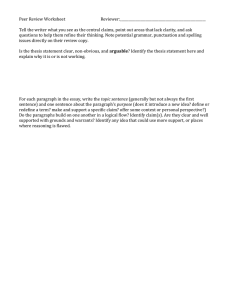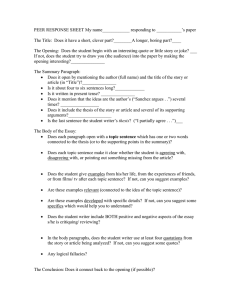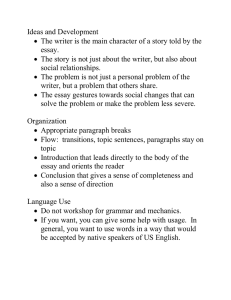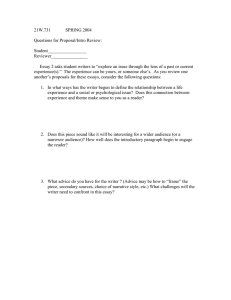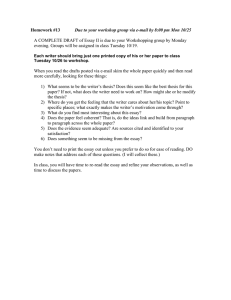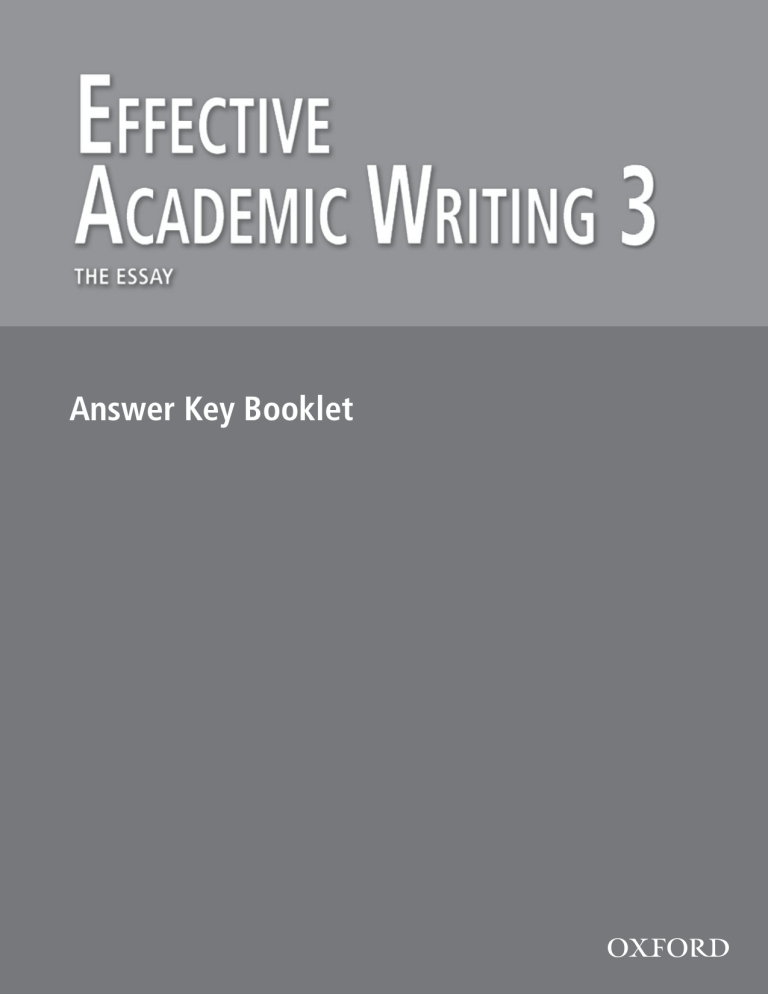
Answer Key Booklet
2
Contents
Answer Key
Unit 1 . . . . . . . . . . . . . . . . . . . . . . . . . . . . . . . . . . . . . . . . . . . . . . . . . . . . . . 1
Unit 2 . . . . . . . . . . . . . . . . . . . . . . . . . . . . . . . . . . . . . . . . . . . . . . . . . . . . . . 5
Unit 3 . . . . . . . . . . . . . . . . . . . . . . . . . . . . . . . . . . . . . . . . . . . . . . . . . . . . . . 7
Unit 4 . . . . . . . . . . . . . . . . . . . . . . . . . . . . . . . . . . . . . . . . . . . . . . . . . . . . . 10
Unit 5 . . . . . . . . . . . . . . . . . . . . . . . . . . . . . . . . . . . . . . . . . . . . . . . . . . . . . 12
Unit 6 . . . . . . . . . . . . . . . . . . . . . . . . . . . . . . . . . . . . . . . . . . . . . . . . . . . . . 15
Great Clarendon Street, Oxford ox2 6dp UK
The Publisher grants permission for the photocopying
of those pages marked “photocopiable” according to the
following conditions. Individual purchasers may make
copies for their own use or for use by classes they teach.
School purchasers may make copies for use by their staff
and students.
Oxford University Press is a department of the University of
Oxford. It furthers the University’s objective of excellence in
research, scholarship, and education by publishing worldwide in
You must not circulate this book in any other binding or cover
and you must impose this same condition on any acquirer.
1
198 Madison Avenue
New York, NY 10016 USA
Oxford New York
Auckland Cape Town Dar es Salaam Hong Kong Karachi
Kuala Lumpur Madrid Melbourne Mexico City Nairobi
New Delhi Shanghai Taipei Toronto
With offices in
Any websites referred to in this publication are in the public
domain and their addresses are provided by Oxford University
Press for information only. Oxford University Press disclaims
any responsibility for the content.
oxford and oxford english are registered trademarks of
Oxford University Press
Executive Publisher: Janet Aitchison
Senior Acquisitions Editor: Pietro Alongi
Associate Editor: Scott Allan Wallick
Art Director: Maj-Britt Hagsted
Production Manager: Shanta Persaud
Production Controller: Eve Wong
© Oxford University Press 2007
isbn: 978-0-19-430884-7
Database right Oxford University Press (maker)
Printed in Hong Kong
All rights reserved. No part of this publication may be
reproduced, stored in a retrieval system, or transmitted, in any
form or by any means, without the prior written permission of
Oxford University Press, with the sole exception of photocopying
carried out under the conditions that follow.
10 9 8 7 6 5 4 3
Argentina Austria Brazil Chile Czech Republic France Greece
Guatemala Hungary Italy Japan Poland Portugal Singapore
South Korea Switzerland Thailand Turkey Ukraine Vietnam
Answer Key
Unit 1
The Five-Paragraph Essay
4. No, the conclusion in the five-paragraph essay is not
different from that of the short essay on page 3.
Part 1: Stimulating Ideas
Part 2: Developing the Five-Paragraph Essay
Exercise 2 (pp. 3–4)
Exercise 1 (p. 9)
A.1. a
2. b
3. c
B. Answers will vary.
1. To achieve this goal, I focused on three points:
the content of an essay, correct grammar, and
advanced level vocabulary. It is the thesis of the
essay because it states what the entire essay is
about.
2. As soon as I started to write for college, I realized
that college writing was different from the writing
I was used to doing. It is the topic sentence because
it states what the body paragraph is about.
3. The details in the body paragraph give
explanations and examples to support the topic
sentence.
4. It sums up the ideas of the essay, and it brings it
to a close.
Exercise 3 (pp. 5–7)
A. Answers will vary.
B. 1. Thesis statement: “To achieve this goal, I focused
on three points: the content of an essay, correct
grammar, and advanced level vocabulary.” No,
the thesis statement is not different from the
thesis statement of the short essay on page 3.
2. Each topic sentence supports the thesis statement.
First body paragraph topic sentence: “As soon as
I started to write for college, I realized that college
writing was different from the writing I was used
to doing.”
Second body paragraph topic sentence: “I realized
I had to improve my understanding of grammar
in order to write for college.”
Third body paragraph topic sentence: “I soon
realized that academic writing required a much
more sophisticated vocabulary.”
3. The body paragraphs of the five-paragraph essay
expand on the information provided in the single
body paragraph of the short essay by giving
examples and anecdotes. The body paragraphs
of the five-paragraph essay are more analytical in
nature.
1. Hook: “It was a sunny day in the summer of 1998
when my family moved out of the city to the
suburbs.”
2. I did not like leaving because I would lose my
friends and the places where I had had so much
fun. It was very sad for me to see my friends
standing in front of the old house as we said our
last goodbyes.
3. Thesis statement: “Little did I know that this
move would turn out to be one of the best
moments of my life.”
4. Topic: “Little did I know that this move . . . ”
5. Controlling idea: “ . . . would turn out to be one
of the best moments of my life.”
Exercise 2 (p. 10)
Body Paragraph 1
Answers will vary.
1. As soon as I started to write for college, I realized
that college writing was different from the writing
I was used to doing.
2. The writer gives supporting details. In high
school, most of the writer’s writing dealt with
personal experiences with family, childhood,
and friends. In contrast, college writing is
focused on a variety of unfamiliar issues, such
as reacting to a piece of literature or writing
about the community. The most important thing
for the writer was to understand the assigned
topic before attempting a first draft. The writer
wanted to include examples, statistics, and direct
quotations whenever possible for support. These
details support the topic sentence because they
elaborate on the topic sentence.
3. b
Body Paragraph 2
Answers will vary.
1. I realized that I had to improve my understanding
of grammar in order to write for college.
2. The writer gives supporting details. Before
the writer came to college, grammar was not
Effective Academic Writing 3: Answer Key
a strong point. The writer often created run-on
sentences or sentence fragments. The writer was
more concerned with what to say than how it
was said. The professors would not accept this
kind of writing and made the writer revise many
times. Consequently, the writer made grammar
the second priority. The writer reviewed the basic
grammatical structures such as subjects and verbs
and checked all work for verb tense consistency
and punctuation. As a result, the writer’s work
became more complex because the writer included
transitional words, gerunds, and embedded
clauses. These details support the topic sentence
because they elaborate on the topic sentence.
3. a
Body Paragraph 3
Answers will vary.
1. I soon realized that academic writing required a
much more sophisticated vocabulary.
2. The writer gives supporting details. The writer
was accustomed to writing letters and informal
essays, so the writer usually wrote the way the
writer speaks with family and friends. It was
common for the writer to include slang and
abbreviated terms, which were appropriate in
social contexts but were unacceptable in formal
essays. The writer’s third goal became improving
vocabulary. The writer bought a dictionary and
thesaurus, became more aware of how often
the same words and phrases were repeated
throughout the essay, and looked for synonyms
to replace words that the writer thought were too
simple for a college essay. The writer also focused
more on the rules of spelling and corrected any
errors. These details support the topic sentence
because they elaborate on the topic sentence.
3. a
Exercise 3 (p. 11)
1. 3
2. The first sentence restates the thesis: “Academic
writing requires critical thinking skills, an
understanding of the topic, high level vocabulary,
and correct grammar.”
3. d
Part 3: Unity and Coherence
Exercise 1 (p. 12)
Having my friends and family together at my
wedding was an amazing experience. I had not seen
some of my uncles, cousins, and aunts for many years.
My cousin Tom lives in London, where he works as
Effective Academic Writing 3: Answer Key
an engineer. Both my mother and father were born in
different countries, so my relatives are scattered all
over the world. I really like traveling and have been to
Europe and Asia. Although we try to get together for
important occasions, this was the first time everyone
could attend. Most importantly, my good friends had
never met my relatives. Developing good friendships
takes a lot of work. Watching them all dancing,
laughing, and having a wonderful time will stay in my
memory forever.
The band we hired played music that the guests
loved and we danced for hours. My original guest
list had over 200 people, but I had to cut it down to
150. It was difficult finding a group that could play all
the diverse styles that I wanted at the wedding. Most
bands specialize in one or two different kinds of music.
However, these musicians really knew all types of
music—from 1940s jazz and swing to salsa, merengue,
and even hip-hop. My brother was once in a rock and
roll band. In short, there was music to suit everyone’s
tastes. I loved the singer’s dress. It was incredible. Even
my grandparents danced all night.
Exercise 2 (p. 14)
1. a, c, d
2. a, b, d, e
Exercise 3 (p. 15)
2. b
3. a
Exercise 4 (p. 16)
Answers will vary.
2. Learning a foreign language takes a lot of
patience and effort. Moreover, it helps to have a
good ear and be able to spend some time in the
host country.
3. The college student was told to revise her essay a
third time. Nevertheless, she has still made great
progress with her writing skills.
4. John Steinbeck, a famous American author, wrote
many books concerning the human condition. For
example, his novel The Grapes of Wrath dealt with
the problems of the Great Depression.
5. Academic writing requires standard grammar,
sophisticated vocabulary, and proper
organization. In contrast, e-mail messages use
abbreviations, symbols, and slang.
6. Nowadays research is often done on the Internet.
Previously, important information was stored on
special film called microfiche.
Exercise 5 (p. 17)
Answers will vary.
A. If you want to make rice, first boil some water.
Next, add rice. Then cook for about 20 minutes.
B. If you want to learn Spanish, the most important
thing is to take a Spanish class. The second
priority is to practice speaking Spanish with
friends. Then visit a Spanish-speaking country.
Exercise 6 (p. 18)
2.
3.
4.
5.
6.
7.
8.
She
this
they
we
us
They
us
Exercise 7 (p. 19)
2. As a teenager, I reported on school events, edited
articles for the high school newspaper, and
published some of my stories.
3. Some of the rewards of being an author are
learning about historical events, researching the
lives of famous people, and discovering facts
about yourself.
4. Attending workshops on writing has taught me
how to receive criticism, become a more focused
writer, and take more risks.
Part 4: Editing Your Writing
Exercise 1 (p. 20)
2. I felt very confident because I had spent a long
time practicing.
3. Since it was my graduation, I bought a beautiful
new outfit.
4. Although the ceremony was very long, nobody
was bored.
5. We went out for a fancy meal after the ceremony
ended.
6. My family took a lot of photographs which I still
enjoy looking at.
Exercise 2 (p. 21)
1.
2.
3.
4.
5.
RO
RO
C
RO
C
Exercise 3 (p. 22)
2. The nineteenth-century British novelist Charlotte
Brontë wrote Jane Eyre, and her younger sister Emily
was the author of the classic Wuthering Heights.
3. Upton Sinclair was concerned about social and
political problems of his times, so he wrote The
Jungle, exposing the unsanitary conditions of the
meatpacking industry.
4. Jane Austen’s original version of Pride and Prejudice
was written when she was only twenty years old,
yet it was not published for almost two decades.
5. The anthropologist Margaret Mead went to
Samoa to collect data for her book, for she was
interested in researching the role of adolescent
girls in a non-Western culture.
6. Writers often use biographical information, or
they adapt the background of other people for
their story.
Exercise 4 (p. 23)
2. Margaret Mitchell was able to write the epic novel
Gone with the Wind because she understood the
decline of the southern plantation owners.
3. Although Somerset Maugham was a doctor, he
wrote many important novels, short stories, and
plays.
4. Some of the Harry Potter books have already been
made into movies since they are so popular.
5. When Wallace Stevens received the Pulitzer Prize
for his collected poems, he was vice president of
an insurance company.
Exercise 5 (p. 24)
Answers will vary.
2. When I visited her, she showed me photos of her
vacation.
3. Because she had a demanding job, she never had
time to visit with friends.
4. Since I was her favorite, I always got a special gift.
5. After she got married, she started working
downtown.
Exercise 6 (p. 25)
While I was visiting China, I (1) experienced
experience a special kind of warmth from the people
I (2) came come in contact with. I was always aware
of their special quality of friendliness. I (3) had have
the unique experience of being in Beijing on the night
the Chinese (4) won win their bid to host the 2008
summer Olympics. On that night, I (5) was am one of
a million and a half people who poured into the streets
to express their joy and gratitude. I walked with them
and (6) shook shake hands with as many people as
I could while I sang out the words: “gong xi ni ba”
Effective Academic Writing 3: Answer Key
(congratulations). My words (7) were are always met
with big smiles and enthusiastic handshakes. Those
parents with kids on their shoulders, teenagers, and
many others (8) felt feel as if the rest of the world was
welcoming them into the global community. Now I wish
them the best, and I am hoping to return one day. If you
take a trip to China, you will experience the same kind
of hospitality.
Part 5: Putting It All Together
Exercise 4 (p. 28)
Exercise 1 (p. 26)
1. Hook: “Difficult life-changing experiences become
the memories that stay forever in our minds.”
2. We have to learn to balance the positive and
negative effects that these situations have on us.
The day after I finished my first year at college, I
had one of these life-changing experiences.
3. Thesis statement: “Going on a job interview at an
international bank taught me an important lesson.”
4. Topic: Going on a job interview at an international
bank.
5. Controlling idea: The writer learned an important
lesson.
Exercise 2 (p. 26)
a. 4
b. 1
c. 7
d. 3
e. 5
f. 2
g. 6
Exercise 3 (p. 27)
A. I was in a rush to get there, (1) so I decided to take
a taxi. The traffic was so horrible that the driver was in
a bad mood. (2) When he He closed the door, my new
skirt got caught. I tried desperately to pull it out, but it
ripped. I thought about asking the driver to stop, (3) but
I was too embarrassed to say anything. Although I was
very upset (4) , . I tried to be calm. The ride was much
longer than I expected, (5) and the air conditioning was
not working. I did not want anything negative to block
my mind (6) . I was eager to have this job. I wanted to
have a good interview and make a strong impression (7)
, since .Since I learned in school that first impressions
are the most valuable.
B. Finally when I arrived at the bank, I (1) looked
look at my skirt. The torn hem was hanging and was
covered with dirt. Once inside, I (2) went go into
the ladies room. I tried to wash my skirt and hold it
together with a safety pin. A few minutes later, I was in
the waiting room when the secretary (3) called call me.
I was embarrassed and afraid that I wouldn’t get the job
because of my sloppy appearance. The most interesting
part was that the manager asked me what (4) happened
happen. When I (5) told tell her the story, she started
to laugh. She (6) couldn’t can’t stop. She wanted to ask
me something about myself, but she (7) kept keeps on
laughing. Now I was sure I would not get the job. She
said, “I will never forget this. I never thought that I (8)
would will have such a good time today. You know,
when you have to interview a lot of people in one day,
it can become very boring.” Despite this ordeal, she
assured me that I had the right qualifications, and in the
end she offered me the position.
Effective Academic Writing 3: Answer Key
1. We never know when a negative experience can
end up being a positive influence on our life and
can stay in our minds forever.
2. d
Exercise 5 (p. 28)
1.
2.
3.
4.
5.
6.
7.
8.
them
it
she
it
mine
me
us
This
Exercise 6 (p. 29)
1. Sometimes when essays are written too quickly
the sentences do not flow naturally. Therefore,
you should always read your essay out loud to
make sure it does.
2. The sonnets of Shakespeare always rhyme. In
contrast, modern poetry usually uses free verse
that does not rhyme.
3. Writing a good play requires a strong story
line. Moreover, you need realistic dialogue and
believable characters.
4. William Shakespeare wrote comedies as well as
tragedies. For example, The Taming of the Shrew
and A Midsummer Night’s Dream both have happy
endings.
5. Computers have grammar and spell check.
Nevertheless, a good writer should not depend on
these tools.
Exercise 7 (p. 30)
1. A few years ago, I went to China to research a
book, meet some old friends, and visit the famous
temples.
2. One day we toured the Ming Dynasty gardens,
walked through the narrow streets, and visited
the Great Wall.
3. I ate with chopsticks, sampled spicy foods, and
drank exotic teas.
4. The Chinese are famous for creating silk screens,
painting lacquer boxes, and inventing calligraphy.
5. I enrolled in a Chinese culture class where I
learned how to write a few characters, speak a
few words, and recognize the different tones of
the language.
Unit 2
Process Analysis Essays
Part 1: Stimulating Ideas
Exercise 3 (p. 34)
will return home to eat and drink. The background
information tells about celebration of the Day of
the Dead. It tells when the celebration occurs and
tells what the holiday is for.
3. Thesis: “In my native town, Puebla, preparation
begins three weeks before the holiday.” Answers
will vary.
4. Body paragraph 3 explains the process of families
decorating and watching over the graves of dead
relatives.
5. a
Part 3: Developing Your Ideas
5. T
Exercise 1 (p. 41)
Answers will vary.
1. He had supernatural powers that helped him see
the dead.
2. Sonja’s offerings to the priests saved his mother.
3. Families clean their homes, decorate the Buddhist
altars, and light lanterns.
4. Both children and adults participate in Bon Odori.
5. Day of the Dead and Halloween
Exercise 2 (p. 42)
1. F
2. T
3. F
4. T
Exercise 4 (p. 34)
Part 2: Brainstorming and Outlining
Exercise 2 (p. 35)
Answers will vary.
1. Costumes: masks, makeup, traditional dress
2. Foods: marshmallows, hamburgers, apple pie
3. Music/Dance: national anthem, folk, circles
4. Decorations: balloons, streamers, confetti
Exercise 3 (p. 36)
Answers will vary.
Exercise 4 (p. 38)
A.1. The Day of the Dead is celebrated to remember
the dead.
2. People buy candles, incense, copal, fruit, flowers,
and candies.
3. The merchants build stalls to protect themselves
and their products from the sunlight.
4. Families go to the cemetery to decorate and to
watch over the graves of dead relatives.
5. Answers will vary.
B. 1. Hook: “Mexican culture is full of colorful
traditions.”
2. One of them is the celebration of the Day of the
Dead. This special holiday for remembering the
dead takes place on November 2 of every year. On
that day, families believe that their dead relatives
The writer prepares a turkey for Thanksgiving
dinner.
A.1. The writer searched the Internet for recipes and
got advice from friends.
2. All the ingredients have to be fresh, especially the
herbs.
3. While the cornbread is baking, the other stuffing
ingredients are being prepared.
4. The size of the turkey determines the cooking
time.
5. Answers will vary.
B. 1. Hook: “The cashier gave me a free 12 pound
turkey because my food receipt was over fifty
dollars.”
2. Thesis statement: “I did not know how to cook
a turkey, but since I had gotten one, I decided it
was a good opportunity to learn how.” Answers
will vary. I wanted to learn how to cook a turkey,
since I had gotten one at the supermarket.
3. before, eventually, while, now, first, second, after,
next, finally, then
4. defrost, prepare, roast, take out, put in, take off,
place, marinate, wash, poke, add, mix, brush,
make, follow, bake, cut, sauté, chop, cool off,
mash up, fill, sew, cook
5. Body paragraph 3 explains the steps in defrosting
and preparing a turkey before it is roasted.
6. The family said that the turkey was amazing
and that the writer should prepare Thanksgiving
dinner next year.
Exercise 3 (p. 44)
first, second, third, next, after this, then, finally
Effective Academic Writing 3: Answer Key

